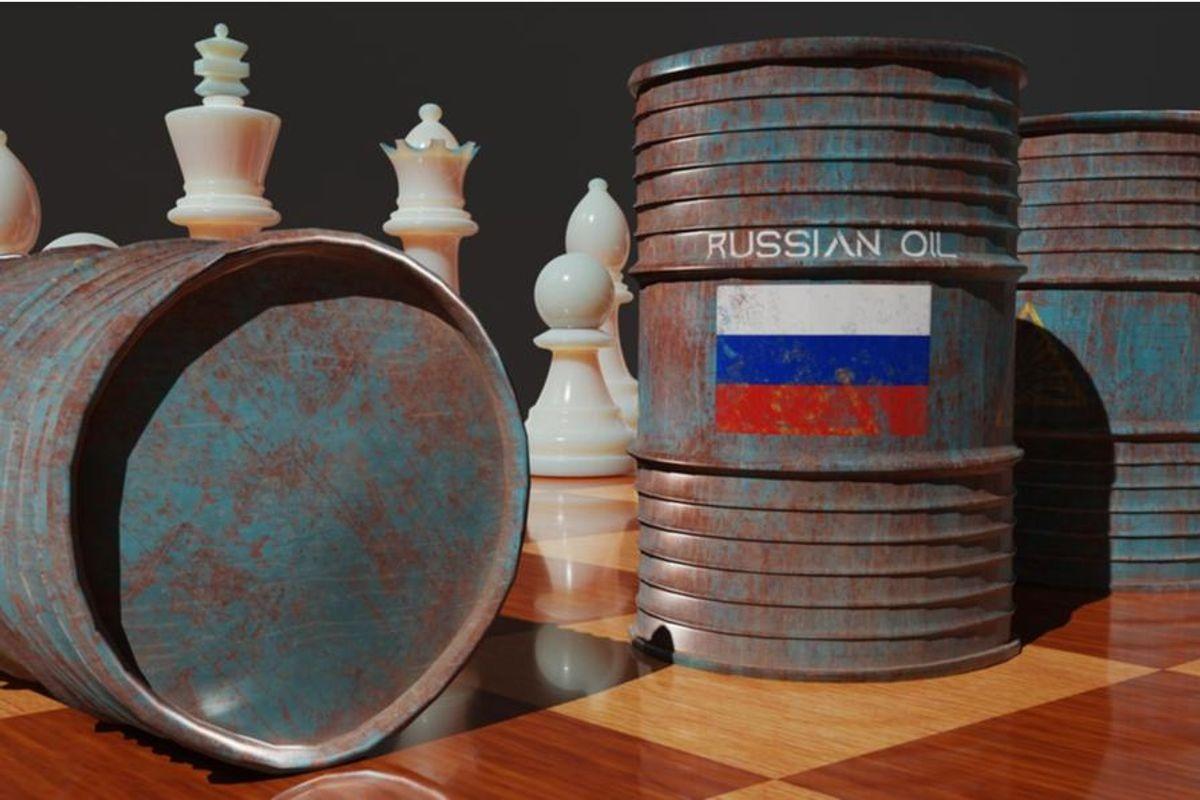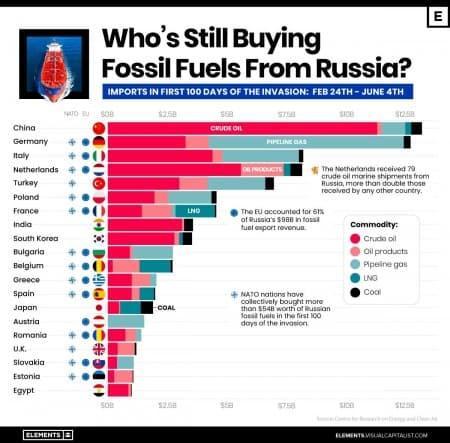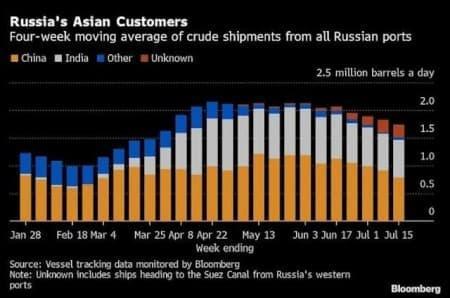
Despite all the sanctions and boycotts, since February 2022, Russia has exported “black gold” for almost a billion dollars a day.
Commodity traders from Switzerland, Singapore and Dubai mediate energy transactions between Russia and Western buyers. The latter cannot buy directly due to European sanctions, so they enter into third-party trades.
And here’s an interesting thing – commodity trading is largely unregulated, meaning that transactions are hard to trace.
Article content
- 1 Who are these intermediaries?
- 2 India and China are seeking to cut off fatter pieces
- 3 The Russian Urals is the best offer on the global market
- 4 The profit rush for Russian oil
- 5 Switzerland is one of the primary links in Russian energy exports
- 6 Swiss trades. Maximum anonymity
- 7 Do you want to invest in oil assets, crypto, foreign stocks? Pick a user-friendly international broker
Sanctions only warmed up the market and created more space for various opportunities.
Higher crude oil and fuel prices have allowed Russian oil and gas revenues to rise even after sanctions led to a drop in exports. There is no shortage of those looking to purchase commodities and derivatives. You can even say that they are in line for cheap Russian Urals crude oil, and there is no shortage of intermediaries who can arrange a deal between Russian exporters and the final buyer.
Who are these intermediaries?
Behind the scenes are Swiss Vitol, Glencore and Gunvor, and Singaporean Trafigura, going on to sell large volumes of Russian oil and petroleum products, including diesel fuel.
Vitol promised to stop buying Russian oil by the end of this year but is actively buying it now. Trafigura declared cutting off all oil purchases from state-owned Rosneft until May 15. But nobody could stop the oil trader from buying commodities through other suppliers without disclosing the details to mass media.
Glencore has vowed not to enter into any “new” trade with Russia but is unlikely to abandon profitable purchases in favor of less profitable partnerships with other countries. Thus, profit is what matters most in the oil business. As for the ethical and emotional parts, they are, so to say, carefully avoided and imperceptibly ignored.
India and China are seeking to cut off fatter pieces
Meanwhile, India and China are trying to cover most of the lost markets for Russian fuel.
Graph 1. Primarily buyers of Russian energy raw materials. Source: Visual Capitalist.
India has never been a core buyer of Russian commodities, despite importing 80% of all its oil. Previously, India exported only 2-5% of its total imports from Russia, which is about the same as what the United States bought before the introduction of a 100% ban on Russian energy.
India imported just 12 million barrels of Russian oil in 2021. Most of the fuel came from Iraq, Saudi Arabia, the United Arab Emirates and Nigeria.
One could notice a “significant increase” in Russian oil supplies to India back in May. In the first three months of the Russia-Ukraine war, India spent about $5.1 billion on Russian oil, gas and coal, more than five times the figure in 2021, according to Bloomberg.
But China is still the biggest buyer of Russian energy. From March to May, the Celestial Empire bought Russian raw materials for $18.9 billion, which is almost twice as much as its 2021 purchases for the same period.
The Russian Urals is the best offer on the global market
According to the IEA, Urals oil (the flagship Russian crude) is offered at record discounts. In its report, Transversal Consulting noted that several oil traders such as Glencore and Vitol offer discounts of $30 and $25 per barrel on this grade.
India has maintained close ties with Russia for years. It is important to note that the Russian Federation supplies India with up to 60% of all exported military equipment. Russia has also acted as the primary ally of India in such issues as India’s dispute with China and Pakistan over the territory of Kashmir.
Graph 2. Asian buyers of Russian oil (China, India and others), million barrels a day. Source: Bloomberg.
The profit rush for Russian oil
India’s energy business with Russia is so flourishing that dozens of new intermediaries have rushed to join in the hope of making good money from the fast-growing sector.
These traders are not giants like Trafiguras, Glencore or Gunvors but smaller and less well-known trading houses, which are now actively negotiating with Indian refineries.
Dubai’s Wellbred and Coral Energy, Singapore’s Montfort and America’s Everest Energy have also entered the race to sell Russian oil to Indians. Indian oil buyers benefit from this state of affairs, as good competition allows them to get more favorable transaction terms.
Bloomberg reports that state-owned refiners such as Indian Oil Corp. are enthusiastic about the idea of buying from lesser-known traders and say there is less bureaucracy with smaller players.
Switzerland is one of the primary links in Russian energy exports
Many companies actively involved in the Russian oil business are based in Switzerland, and the lion’s share of Russian crude is sold via Switzerland, through nearly 1,000 commodity trading firms.
Switzerland is still one of the world’s leading and most competitive financial centers with a thriving commodity sector, even though it’s landlocked and far from the main trade routes.
According to Public Eye, the raw materials sector accounts for a much larger share of Switzerland’s GDP than tourism or engineering. In 2018, the trade volume in commodities amounted to almost $1 trillion ($903.8 billion).
Deutsche Welle writes that 80% of Russian raw materials are sold via Switzerland, taking into account the report of the Swiss Embassy in Moscow. About a third of the raw materials are oil and gas, and two-thirds are zinc, copper and aluminum. In other words, Swiss contracts are a ticket for Russian commodities to the global market.
Since commodity export is the key income source for Russia (30-40% of the budget), the role of Switzerland in the welfare growth of the Russian Federation seems to be significant. In 2021, Russian state corporations earned about $180 billion from oil exports alone.

Swiss trades. Maximum anonymity
Raw materials are often traded directly between governments or through commodity exchanges. However, oil can be sold through private companies on both sides.
Switzerland focuses on direct commodity sales, as the country has a lot of money, so it doesn’t have any issues with deal capture.
Swiss traders widely use letters of credit. The bank issues a loan to the trader and receives a collateral, turning the bank into the temporary owner of the goods.
As soon as the buyer pays the bank, the documents and ownership of the goods pass to the trader. The system provides traders with more credit lines without the need to check their creditworthiness, and the bank takes ownership of the goods as a guarantee against non-payment.
It is a classic example of the Swiss model of transit trade, when only money passes through Switzerland, and the physical materials are turning around in other countries. Thus, no details about the amount of the transaction fall on the table of the Swiss customs authorities. In total, Switzerland has everything not to show its Russian affairs publicly.
Interestingly, in contrast to the financial market, where there are strict rules to combat money laundering and illegal financial flows, there are currently no such laws for trading commodities.
Do you want to invest in oil assets, crypto, foreign stocks? Pick a user-friendly international broker

2022 seems to be a perfect time when global market volatility can make money both for large and small investors.
Stable and understandable trends that create the basis for correct price forecasting and profitable trades.
You can open an account with an international online broker to invest freely and comfortably.








